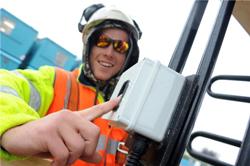Oct 26 2009
Technology developed by the University of Warwick that can identify partial, distorted, scratched, smudged, or otherwise warped fingerprints in just a few seconds has just scored top marks in the world’s two toughest technical fingerprint tests. The technology is also being rapidly taken up by the UK building trade who are delighted to have fingerprint technology which can cope with the often worn and ravaged builders’ thumbprints.
 Warwick Warp BioLog equipment in use on a Coventry building site- Simon Catchpole, Steel Erector
Warwick Warp BioLog equipment in use on a Coventry building site- Simon Catchpole, Steel Erector
Many other fingerprint techniques have tried to identify a few key features on a finger print and laboriously match them against a database of templates. The University of Warwick researchers consider the entire detailed pattern of each print and transform the topological pattern into a standard co-ordinate system. This allows the researchers to "unwarp" any finger print that has been distorted by smudging, uneven pressure, or other distortion and create a clear digital representation of the fingerprint that can then be mapped on to an "image space" of all other finger prints held on a database. Instead of laboriously comparing a print against each entry in a database any new print scanned by the system is unwarped and over laid onto a virtual "image space" that includes all the fingerprints available to the database. It does not matter whether it’s a thousand or a million fingerprints in the database the result comes back in seconds.
This technology has been taken forward by a University of Warwick Spin out company “Warwick Warp” and has now been snapped up by Data Collection Strategies DCS specialist Access control installer for the construction industry who have just deployed it for security and staff management on 6 building sites.
Rodney Holland, Managing Director of Data Collection Strategies said: “This is the first time I have seen a biometrics system that works reliably with the type of poor quality fingerprints we see routinely in the construction industry. We have already installed Warwick Warp’s BioLog system at six major sites and our customers love it because it is fast, accurate and eliminates the “buddy punching” problems of older card based access systems.”
The technology has impressed more than just the construction industry. In the past week the technology has been examined by two of the world’s most respected technical fingerprint benchmarking tests. Tests by the National Physical Laboratory ranked Warwick Warp’s fingerprint Technology best overall for accuracy. A test of 36 finger print technologies by the US’s National Institute of Standards and Technology (NIST) ranked Warwick 3rd overall”
Tony Mansfield, Principal Research Scientist and Biometric Expert at the National Physical Laboratory said, "Improving accuracy on low quality images is important for many biometric applications, and I am delighted to see that the innovative approach of a British company scored so highly in the benchmark test."
Dr Li Wang, Chief Technology Officer at Warwick Warp said:
“This is a great result for Warwick Warp as NIST’s test results are used by government and law enforcement agencies when procuring fingerprint technology. Being ranked in the top three for our performance on good fingerprint data really puts us on the map with significant potential partners. Next we hope to demonstrate to these same organisations that if you were to benchmark the same companies with partial or distorted prints our technology would simply eclipse anything else currently available.”
This unwarping is so effective that it also allows comparison of the position of individual sweat pores on finger print. This has not previously been possible as the hundreds of pores on an individual finger are so densely packed that the slightest distortion prevented analysts from using them to differentiate finger prints.
The Technology was developed in Warwick Warp Ltd founded by three University of Warwick researchers in the University’s Department of Computer Science: Professor Roland Wilson, Dr Abhir Bhalerao, and Dr Li Wang.
Source: http://www2.warwick.ac.uk/